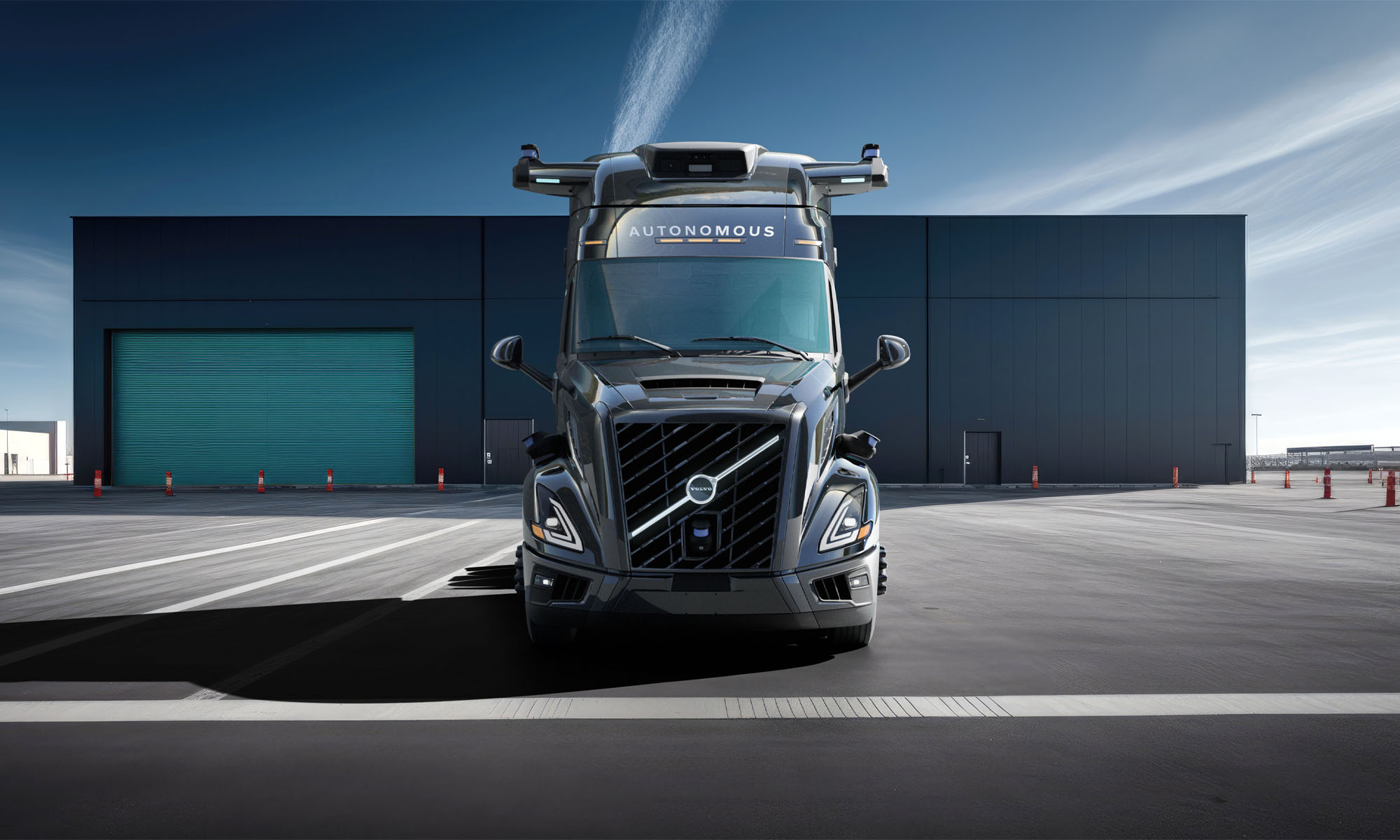News
Volvo And Aurora Announce Their First Self-Driving Truck
The new autonomous goods vehicle was revealed at the ACT Expo in Las Vegas.

Vehicle maker Volvo and self-driving specialist Aurora have revealed their first production truck with full autonomous capabilities, after first announcing a partnership three years ago. The companies showed off the product of their collaboration, known as the Volvo VNL Autonomous truck, at the ACT Expo in Las Vegas.
The truck, which will be manufactured by Volvo, uses Aurora’s self-driving platform, known as Aurora Driver. The system uses multiple high-resolution cameras, LiDAR sensors and imaging radars, and can detect objects up to 400 meters away.
Aurora’s platform has already been driven billions of miles in training simulations, and around 1.5 million miles on real public highways. As well as a wide range of imaging and sensing technologies, the truck will also feature redundant steering, braking, communication, computation, power management, energy storage and vehicle motion management systems, ensuring it can operate safely alongside other road users.
Also Read: NETGEAR’s Orbi 970 Routers Offer Powerful Wi-Fi 7 Connectivity
When the first 20 Aurora autonomous trucks make their debut in North America next month, they will still be overseen by human drivers until testing is complete. Aurora intends to deploy trucks between Dallas and Houston in the near future, but it’s unclear whether the fleet will consist of Volvo machinery or vehicles from another partner.
Volvo announced at the Las Vegas event that it has already begun manufacturing a test fleet of the VNL Autonomous trucks at its New River Valley factory in Virginia. Nils Jaeger, President of Volvo Autonomous Solutions, explained that the truck was the “first of [the company’s] standardized global autonomous technology platform,” and added that it would enable Volvo “to introduce additional models in the future”.
News
Alienware Just Announced Six New Gaming Monitors
The new models include three QD-OLED and three budget-friendly QHD options, expanding the company’s lineup for all gamers.

Alienware has just updated its gaming monitor lineup with six new additions, including the highly anticipated Alienware 27 4K QD-OLED Monitor. The latest wave of releases is set to reach more gamers than ever, offering high-end QD-OLED displays alongside more budget-friendly options.
The latest displays clearly show that the company is doubling down on QD-OLED with three new models sporting the technology. A redesigned Alienware 34 Ultra-Wide QD-OLED Monitor is also making a return, further refining what is already a fan-favorite display.
A Unified Design: The AW30 Aesthetic
All six monitors feature Alienware’s new AW30 design language, first introduced at CES. The AW30 aesthetic brings a futuristic, minimalist look that unites the entire lineup under a cohesive visual identity.
Pushing QD-OLED Even Further
The refreshed Alienware 34 Ultra-Wide QD-OLED Monitor (AW3425DW) builds on its predecessor’s success with a 240Hz refresh rate (up from 175Hz) and HDMI 2.1 FRL support. It also gains G-SYNC Compatible certification alongside AMD FreeSync Premium Pro and VESA AdaptiveSync, ensuring ultra-smooth performance. With a WQHD (3440×1440) resolution and an 1800R curve, this display enhances immersion for both gaming and cinematic experiences.
For those who crave speed, the Alienware 27 280Hz QD-OLED Monitor (AW2725D) pairs a high refresh rate with QHD resolution, balancing sharp visuals with ultra-smooth gameplay. Meanwhile, the Alienware 27 4K QD-OLED Monitor (AW2725Q) delivers stunning clarity with an industry-leading pixel density of 166 PPI, making it the sharpest OLED or QD-OLED monitor available.
Also Read: Infinite Reality Acquires Napster In $207 Million Deal
Worried about OLED burn-in? Alienware’s entire QD-OLED lineup comes with a three-year limited warranty covering burn-in concerns, offering peace of mind for gamers investing in these high-end displays.
Bringing QHD To A Wider Audience
Alongside QD-OLED, Alienware is also releasing three new QHD gaming monitors aimed at more price-conscious gamers. The Alienware 34 Gaming Monitor (AW3425DWM), Alienware 32 Gaming Monitor (AW3225DM), and Alienware 27 Gaming Monitor (AW2725DM) provide a range of sizes and formats to suit different preferences:
- The Alienware 34 Gaming Monitor (AW3425DWM): An ultrawide (WQHD) option for a panoramic, immersive experience.
- The Alienware 32 Gaming Monitor (AW3225DM): A standard 16:9 panel for a traditional but expansive desktop setup.
- The Alienware 27 Gaming Monitor (AW2725DM): A 27” display offering the same performance in a more compact form factor.
All three gaming monitors feature a fast 180 Hz refresh rate, a 1ms gray-to-gray response time, and support for NVIDIA G-SYNC, AMD FreeSync, and VESA AdaptiveSync to eliminate screen tearing. Additionally, with 95% DCI-P3 color coverage and VESA DisplayHDR400 certification, these displays deliver vibrant colors and high dynamic range for lifelike visuals.


























